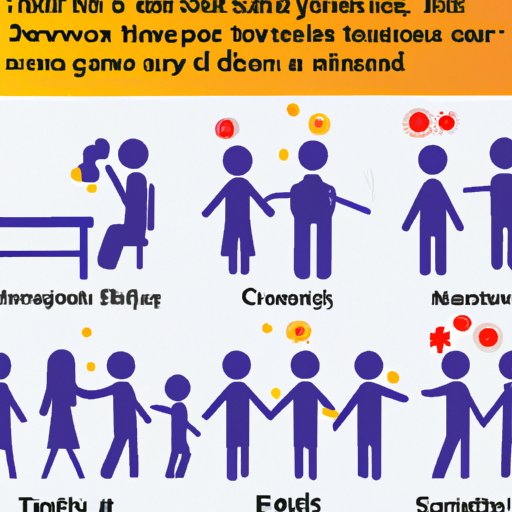Introduction
A fever is a sign that your body is fighting an infection or illness. It occurs when the body’s internal temperature rises above the normal 98.6°F (37°C). Generally, a fever isn’t considered dangerous unless it exceeds 103°F (39.4°C). However, it can be uncomfortable and irritating and even lead to other health complications.
When we look at contagiousness and fever, it’s important to understand that not all fevers are contagious. But if you have an infectious disease such as the flu, chickenpox, or measles, it’s possible for you to spread the virus to others even after your fever has broken.
In this article, we’ll explore the length of contagiousness after a fever breaks, common myths and misconceptions about fever-related contagiousness, and when you can return to work or school after a fever.

Exploring the Length of Contagiousness After Fever Breaks
It’s important to note that the period of contagiousness can vary depending on the type of virus or infection causing the fever. For example, the contagious period for the flu is typically between one day before symptoms begin and up to seven days after symptoms start. In some cases, people with the flu can remain contagious for longer than seven days.
How long are you contagious after a fever? Generally, you’re contagious from the first day of your fever until at least 24 hours after it has ended. While the exact duration can vary depending on the virus or illness, it’s best to assume that you’re contagious until at least 24 hours after your fever has broken.
What factors affect contagiousness after a fever? The amount of time you’re contagious can depend on the specific virus or infection causing the fever, as well as the severity of your symptoms. Additionally, if you’re taking any medications to treat your fever, they can also impact the length of contagiousness.
Understanding the Risk of Spreading Illness After the Fever Breaks
It’s important to understand the risk of spreading illness after your fever has broken. Although your fever may have gone away, you could still be contagious and spread the virus to others. It’s essential to take precautions to reduce the risk of spreading the virus.
Common myths and misconceptions about fever-related contagiousness include the belief that once you’ve had a fever for more than 24 hours, you’re no longer contagious. This isn’t necessarily true, as you can still be contagious for several days after your fever has ended. Additionally, many people mistakenly believe that a low-grade fever doesn’t pose a risk of contagion. However, this isn’t true either, as people with low-grade fevers can still transmit viruses to others.
How can you reduce the chance of spread after a fever has ended? The most effective way to reduce the risk of spreading illness is to practice good hygiene. This includes washing your hands frequently with soap and water, avoiding close contact with others, and covering your mouth when you sneeze or cough. Additionally, it’s important to get plenty of rest and drink lots of fluids to help your body recover.
When Can You Return to Work or School After a Fever?
If you’ve had a fever, it’s important to follow the advice of medical professionals regarding when you can return to work or school. Generally, your doctor will advise you to stay home until at least 24 hours after your fever has broken. Additionally, your doctor may recommend staying home for several days after your fever has ended, depending on the severity of your symptoms and the type of virus or infection.
When returning to work or school after a fever, it’s important to consider the potential risk of spreading the virus to others. If you have a weakened immune system or are caring for someone with a weakened immune system, it’s best to wait until you’re feeling better before returning to work or school.
Conclusion
In conclusion, although a fever may break, you could still be contagious. The length of contagiousness after a fever can vary depending on the virus or infection causing the fever, as well as the severity of your symptoms. Common myths and misconceptions about fever-related contagiousness include the belief that once you’ve had a fever for more than 24 hours, you’re no longer contagious, and that low-grade fevers don’t pose a risk of contagion. To reduce the risk of spreading the virus, it’s important to practice good hygiene and follow the advice of medical professionals regarding when you can return to work or school.
By understanding the length of contagiousness after a fever and taking precautions to reduce the risk of spreading the virus, you can help keep yourself and others safe.
(Note: Is this article not meeting your expectations? Do you have knowledge or insights to share? Unlock new opportunities and expand your reach by joining our authors team. Click Registration to join us and share your expertise with our readers.)
